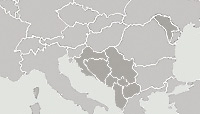Interview with Želimir Žilnik
A Force Moving Movies
*Shortened version of the interview published in VREME, no 778, Belgrade, Dec. 2005
“In my movies I show that in today’s world, the ‘scum’ of society are not those people who walk around in worn shoes and tattered clothes. The real ‘trash’ of the Balkans are the ones wearing fine fabrics and expensive suits.” (Written by: Teofil Pančić, Nebojša Grujičić)
It’s amazing how Teras Kermanuer’s old idea referring to the poetics of his work as “never consistent—always radical” creeps into ones consciousness in the context of Želimir Žilnik’s creations, and to a certain extent can be applied to his life and work; only to a certain extent, though, for Želimir Žilnik is both consistent and radical—a combination that is never boring. Due to circumstances as well as his personal intellectual make-up, Žilnik kept away from local mainstream movie production. Regardless of whatever regime was in power at the time, he followed his own particular aesthetic sensibility, shunning the slow degradation of the “village-style cinema full of provincial glamour” that has marked the downfall of the Serbian film industry.
In your latest movies...
—Tvrđava Europe [Fortress Europe], Kenedi se vraća kuć [Kenedi Comes Back Home], Evropa preko plota [Europe Next Door] you deal with living within the boundaries of Europe, and confront the problem of how to cross those boundaries as an individual and as a nation. What has led you to spend the last ten years focusing on this theme?
The bare facts of war and the collapse of Yugoslavia have made it necessary to ask essential questions regarding our identity; the identity we have discovered and the one that remains uncovered. It is debatable if historians have really revealed the true identities of the first two states, both called “Yugoslavia”; the original one ruled by King Alexander and the second one run by a communist regime. Were we misled by history? Or did we discover our true identity? I claim that the rationale behind forming the first and second Yugoslavian state was the same as the one behind the creation of any number of European states, a century ago, at a time when the South Slavs were citizens of two empires in conflict, two very different civilizations—the Ottoman Empire and the Austrian Monarchy. That, however, didn’t stop brilliant minds from constructing a collective South Slav State back in the 1850s. And in all fairness, the discrepancies when it came to economics, culture, language and the “degree of civilization” were no greater between Skopje and Zagreb than between Sicily and Milan or Munich and Hamburg, at the time when these confederate states were founded. It is interesting to note that the cruelest tools from Europe’s arsenal of war and violence were applied in the destruction of both Yugoslavias: national-socialism, fascism—even the forced exodus of national groups and episodes of ethnic cleansing.
However, the average citizen has pleasant memories of both these former Yugoslavias—once they dissolved into the past, that is. As a kid, I heard my share of stories about “the good life before the war.” And now the next generation is destined to hear the same old stories. The conclusion seems to be that the “Yugoslavias” didn’t just disappear through the will of its citizens, but because of the power and self-interest of the ruling classes, whether foreign or national.
But the country is gone and there is no going back. So, what do the youngsters of Ex-Yugolavia have to say about the future? They can’t say that they would like to live together again; that would be impossible to say after so much death and destruction took place just so a few “tribal chiefs’ could promote themselves to the status of “father’s of a nation.” They say something else—something which only confirms the above assumption—namely, that they want to leave the country, as soon as possible. To go where? Well, why not go to those place where other Balkan warriors, nationalists and party faithful alike are allowed to live luxuriously in style: Paris, London, Vienna … These members of the “establishment” dream of forgetting all this speculation about the Balkans once they settled down in their city of choice, because the Louvre, the Belvedere, or the Tower of London were probably not built without some bloodshed or injustice or slave labor or something equally unscrupulous, after all, damn it, if you really want to know.
And so, after all the war, all the devastation and all the boundaries had been set-up, we swore we would never live under a common roof again, and presto, next thing you know, here we are eager to share the cover of an all encompassing European tent. And even though they still aren’t letting us in—we aim to push and shove our way through. They’ll probably let us in at the end of the day; they’ve accepted far worse countries. This is the general attitude throughout all of Serbia, from Đevđelija to Kumerovac. I’m fascinated by how now all of a sudden everyone seems to be interested in “European values and norms” even though I’m afraid they don’t have a clue about any of this, just like our royalists who simply choose to overlook what King Alexander said on his deathbed and left as his message.
There is much confusion regarding identity...
Yugoslavian, national and European identities seem to be all tangled up.
This doesn’t apply only to us. Look at the regional, cultural and linguistic differences in Spain, Britain, Italy. One of the goals of European unification, among other things, was to rationalize and smooth out suppressed tension between complicated and conflicting identities, in globally unstable economic times. And all this now, a decade before China and India become the economic powers of the world. In two decades, their culture and traditions (five-six thousands years older and richer than Europe’s), will play a leading role. Europe must collect and unite not only its strengths, but also bridge its differences, when it sits down to negotiate with huge nations like Indonesia, India, Bangladesh, Brazil and China—nations billions of people strong with hundreds of minorities.
Europe on the other side of the fence...
is a fact of our lives right now. We are facing the consequences of the events of the last fifteen years. In 1988 you made a movie called Stara mašina [Old Timer], which is a key to understanding the break-up of former Yugoslavia. The movie is about a man who has lost his job as editor at the student radio station, and embarks on a motorbike journey across Yugoslavia, from Slovenia through Bosnia to Novi Sad. Caught in the middle of so the called “anti-bureaucracy revolution”[1], he sees that his country is falling apart, and flees to Greece. The imagery and symbolism of the political gatherings at that time were communist in nature, and the messages were nationalistic, as exemplified by the chant “Rain tumbles as Pristina crumbles, the wind blows as Serbia grows.” How do you view those times from today’s perspective?
When I shot that movie, in the summer of 1988, Yugoslavia was undergoing great structural upheaval—the ruling class was trying to hold on to its position, and keep its head above water. Now people talk openly about this, on TV as well. About a month ago, I saw a talk show on the Croatian TV-channel (HRT) about the secret police and the fall of Yugoslavia. The topic was prompted by an event: the Germans were calling for the arrest of the secret service (Udba) member who, in the seventies, in Germany, had killed an INA[2] functionary (Stjepan Đureković) for criticizing Tito. The assassin then fled the country, stealing some money as well. A guest on the show, Mr. Manolić, a high ranking police officer during both communist and nationalist regimes, gently and tactfully explained that the secret police was supposed to protect all people, regardless of their personal history, providing they towed the new party line. There were tensions in Slovenia and even some arrangements with “colleagues from other republics” to descramble the system. I remember something funny and sad that happened to me when I brought some recorded material to TV Ljubljana and openly talked about the “Anti-bureaucratic revolution,” with its iconography of socialism and nationalism, labeling it as “Mussolinian.” “Wait”, they said, “we have to call comrade Smole from the Socialist League about this.” And comrade Smole came, sat down and watched the entire TV movie, before informing me that I had misunderstood “comrade Sloba[3], who is simply using a bit more rigid methods”—and banned the movie from being broadcast. It was only a few months later, after they had definitely parted company with “comrade Sloba,” that the movie was indeed broadcast.
[1] A time of protests against the autonomous government in Vojvodina (translator’s comment).
[2] A Croatian oil refinery (translators comment).
[3] Slobodan Milošević : Sloba is the short form of Slobodan, but he was often wrongly referred to as Slobo by the international press due their negligence of Serbian grammar. In the vocative tense when someone is called or addressed directly (the “a” changes to “o”). So at demonstrations “Sloba” was addressed as “Slobo” (as in the chant “Slobo, Slobo”) leading to the misinterpretation of his name.
The Slovenian nomenclature dissolved itself...
and the transition was reached through compromise. In Serbia, political gatherings shifted the negative energy and hysterics of earlier partisan anathemas and campaigns to finding ‘enemies’ in local neighborhood, and in discriminating against “other” ethnic nationalities. The tools for this were national-socialist ones, loaded with all the sentiment and stories about a country with centuries of history. Mussolini went to Ethiopia, and our warriors, as the current legal cases show, went to hangars and neighborhood schools …
What is your view now of all those past and current ideological paradigms?
Any ideology, ripened by experience and measured in decades, has always been a publicly proclaimed and distributed lie. And if you look over the past ten years of transition and the move towards capitalism, this has remained more or less the same. The actual ideology of capitalism gone wild is very banal and already has many opponents. It is still unclear how this will develop. What we do know, however, is that there is a clear resistance to Bush’s politics and protests against the handling of the Iraq issue. I’d like to live long enough to see the reactions of the impoverished masses, stripped of their rights, in a broader post-communist context and territory.



















